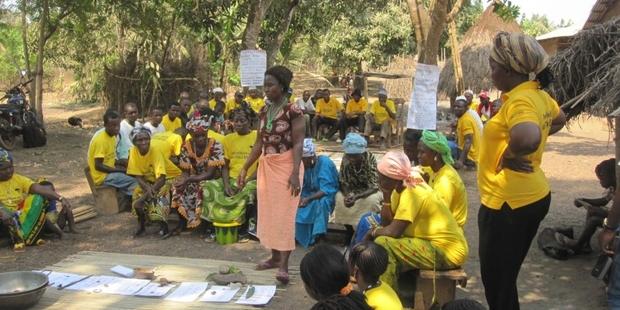While activists gather in London today to discuss strategies to tackle female genital mutilation, communities across Sierra Leone have been taking an innovative approach towards ending the brutal practice.

As several dozen women sat in a circle in the Chiefdom of Masungbala in North West Sierra Leone, discussing their stories of horror and pain, the male community leaders shared their own views in a separate group.
The women, one by one, described how their genitals had been cut off as part of rituals of initiation and the almost unbearable pain they were forced to endure.
Most of them said they regretted having supported the practice and were adamant that their daughters shouldn’t suffer the same.
A few steps away from them, the male leaders discussed how the community could tackle this problem.
And then, what was thought impossible, happened.
After days of discussions and negotiations in the context of a series of workshops run by Amnesty International and local organizations in August 2011, the community signed a Memorandum of Understanding that bans female genital mutilation for girls under 18 years of age. The memorandum also establishes that any woman over that age has to give her consent before the procedure takes place.
Approximately 600 girls were saved from mutilation in the Masungbala Chiefdom within a month of the Memorandum of Understanding being signed.
The experience of the workshops was so positive that local activists say hundreds of communities across the country have since followed suit and also banned the harmful practice.
“Although the 2007 Child Rights Act protects children from harmful practices, there is no law that specifically bans Female Genital Mutilation in Sierra Leone but these communities are giving a great example of what is possible,” said Aminatou Sar, Africa Human Rights Education Manager at Amnesty International.
It became clear that people knew they wanted to tackle the issue but did not know how to go about it. Now the process has completely changed the lives of many women and girls.
Arun Turay, Coordinator of the Advocacy Movement Network (AMNET)
Breaking the silence
“Sierra Leone could become a Female Genital Mutilation free zone,” said Arun Turay, Coordinator of the Advocacy Movement Network (AMNET) who, together with Amnesty International, ran the workshops to raise awareness among targeted communities to bring them to take action to fight FGM.
The project is part of Amnesty International’s Africa Human Rights Education Programme currently running in seven communities in the Kambia District in Sierra Leone. The Programme focuses on a number of human rights issues affecting local communities, including female genital mutilation.“It is very difficult for people to talk about these issues but as the communities have a strong tradition of dialogue, we called the community members together to discuss the dangers of female genital mutilation,” explained Arun.
“It became clear that people knew they wanted to tackle the issue but did not know how to go about it. Now the process has completely changed the lives of many women and girls.”
Arun is still in regular contact with the communities.
“Only a few months ago, the leaders told me that the change of practice has now been fully accepted and that attention has now moved onto educating girls,” said Arun.
The reason the agreements are working, Arun says, is because most community members are committed to them as a result of a process of dialogue initiated by the workshops.
Only a few months ago, the leaders told me that the change of practice has now been fully accepted and that attention has now moved onto educating girls
Arun Turay, Coordinator of the Advocacy Movement Network (AMNET)
140 million women and girls
The World Health Organization estimates that up to 140 million women and girls have been subjected to genital mutilation across the world.
The procedure can be carried out at a variety of ages, from shortly after birth to when a woman has matured.
Women and girls who have their external genitalia removed often suffer from severe pain, bleeding, shock, difficulty in passing urine, infections and sometimes even death.
Many also suffer chronic pain, difficulties during labour – including a higher risk of maternal mortality – decreased sexual enjoyment and post-traumatic stress disorder.
Community leaders and members who support and practice female genital mutilation say it is necessary to protect women’s so-called “honour”. This reflects widely-held stereotypes about women’s sexuality and the belief that it must be controlled. Additionally, in some societies beliefs persist that regard unmutilated women as unclean and do not allow them to handle food and water.
The experience in Sierra Leone has made Arun positive about the future.
“What happened in the communities we worked with in Sierra Leone could happen in other countries in Africa or even across the world. Community dialogue is a powerful human rights education tool and can lead to change,” he said.

